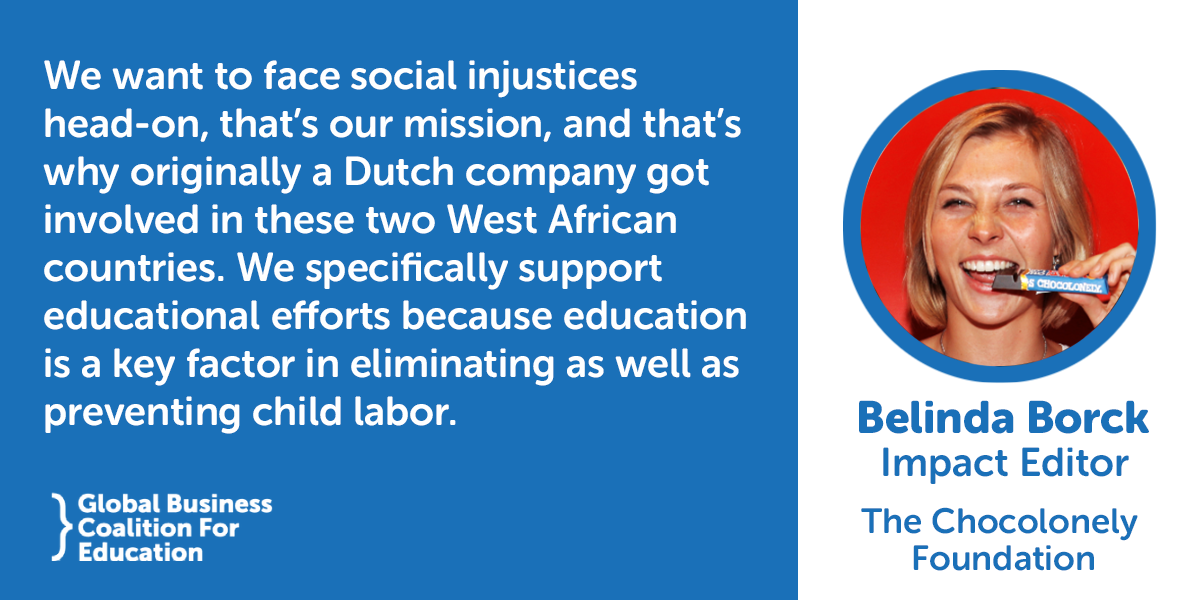Investing in education abroad to fight child labor: a discussion with the Chocolonely foundation

Photo by Seth DoyleDuring our conversation on the role small and medium enterprises (SMEs) can play in supporting education, we asked Belinda Borck, Impact Editor at the Chocolonely Foundation, about the work they are doing in Ghana and Ivory Coast. The Chocolonely Foundation is an independent organization funded primarily by Tony’s Chocolonely – a chocolate bars producer- which donates 1% of its annual net sales to projects supported by the Foundation.
Why does your company support education abroad?
At Tony’s Chocolonely, we are an impact company that sells chocolate. Our mission is to make all chocolate worldwide 100% slave-free. That means free of child labor and free of forced labor. Sixty percent of the world’s cocoa is being produced by smallholder farmers in West Africa who live in poverty. Illegal child labor is a dominant issue in the cocoa sector in Ghana and Ivory Coast with 1.56 million children working and over 30 000 victims of modern slavery. We source the cocoa for our chocolate bars from Ghana and ivory coast. Children who are working cannot go to school and will lack the skills to be able to move out of property. Likewise, poverty is the greatest single factor that forces children to work. Poverty in itself is a very complex and multi-dimensional issue, and we aim to go about the issue together with our partners on the ground and the cocoa communities we source from. That’s why we have a direct and personal relationship with the cocoa cooperatives and the communities in Ghana and Ivory Coast. We work together to fight poverty in this unequally divided chain. This means that we listen specifically to their needs. We currently work with six different cooperatives that provide a lot of different realities on the ground. But one aspect does emerge across country lines and across all communities and it’s the fact that it is not only about access to education but about access to quality education. This requires a lot of attention. We work with the cocoa cooperatives and the communities on annual community development plans that result in building infrastructure such as schools, school libraries or computer rooms. We implement these programs to increase the quality of education via the Chocolonely foundation.
Children who are working cannot go to school and will lack the skills to be able to move out of property. Likewise, poverty is the greatest single factor that forces children to work. Poverty in itself is a very complex and multi-dimensional issue, and we aim to go about the issue together with our partners on the ground and the cocoa communities we source from. That’s why we have a direct and personal relationship with the cocoa cooperatives and the communities in Ghana and Ivory Coast. We work together to fight poverty in this unequally divided chain. This means that we listen specifically to their needs. We currently work with six different cooperatives that provide a lot of different realities on the ground. But one aspect does emerge across country lines and across all communities and it’s the fact that it is not only about access to education but about access to quality education. This requires a lot of attention. We work with the cocoa cooperatives and the communities on annual community development plans that result in building infrastructure such as schools, school libraries or computer rooms. We implement these programs to increase the quality of education via the Chocolonely foundation.
What has your company’s experience been investing in other countries?
Our mission is to create equality in the cocoa sector, so we will keep on focusing on Ghana and Ivory Coast. We don’t have any plans to expand beyond Ghana and Ivory Coast. What we aim for is to create high level business relationships, business relationships that are built on trust and that rely on a human rights base rather than a charity-based approach. That’s a very important basis to be able to use business as a force for good. I would say that the learning process is kind of never over. We constantly improve by listening to our partners and following their guidance on what is actually needed, how we can be the most impactful. It’s about the continuous reassessment via annual needs assessments and the resulting plans that we develop together with the cooperatives. We aim to roll out a quite far-sighted and sustainable plan to implement access to quality education in all of the communities that we source from. What should be avoided is initiatives that aren’t rooted in the community communities and that do not have their involvement at their core. That undermines any kind of initiative sustainability and it is always vital to align with national stakeholders such as the Ministry of Education. In the end it’s also really about both so it’s on the one hand about the access to education but also really about the quality of education. This can especially be achieved by not only doing this individually because it’s the force of all of us together no matter the size. Industry-wide initiatives are needed which is why we are also partners of strong coalitions with other companies in the chocolate and cocoa industry. At the moment for example we support the Ivorian government in one of its strategic objectives to combat child labor and provide a good start in life and quality education. Industry initiatives is definitely something to continue with.
Read GBC-Education latest report on the role of small and medium enterprises in education:
An Untapped Force for Global Education: An exploration of small and medium enterprises
